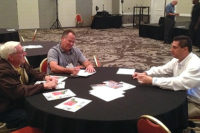A lot of times, when talking about heating or cooling a home, all the focus is on either the furnace or the air conditioner. Of course, HVAC contractors know better than that. That is why when talking with homeowners the good contractors always talk about HVAC as a system.
This can mean a lot of things. Items like the ductwork, ventilation, and IAQ products certainly contribute. However, one of the more underrated items that do not receive the attention they deserve is the insulation. Unfortunately, homeowners are not the only ones who sometimes look past this important aspect of the HVAC system. More often than the industry wants, HVAC contractors overlook it as well.
“Unfortunately, a lot of guys tend to look past it. They assume, based off a certain houses age, that the insulation is there. And when it is there we assume that it magically does what it is supposed to,” said David Richardson of National Comfort Institute. “We overlook it and get tunnel vision on what we do which is making sure the equipment is doing what it is supposed to be doing. And we forget that the building that we are conditioning has to contain all that heat.”
Of course, that does not mean all HVAC contractors. A lot of the good ones include an inspection of the insulation to get a better idea on how the HVAC system is working. In the HVAC contracting world, this is a part of what is called home-performance contracting and it has gained momentum over the past 10 years.
It has gained in popularity because the homeowner market is changing. Comfort in the home and energy efficiency is now on the top of minds of most consumers. The old days of simply changing out boxes will not suffice. In the contractor’s world, there is money to be made in the whole home approach in two ways. There is additional revenue as homeowners buy more add-ons to increase their comfort and also because these homeowners soon become lifelong customers.
It begins with a whole home audit where contractors can see what fixes need to be made. A lot of times, the list is long. In this case, many homeowners choose not to do all the fixes as once. Instead, they do what they can afford over a number of years. A lot of these improvements can translate into state and local utility rebates for homeowners. While HVAC contractors will make most of the improvements, they can also subcontract out the jobs they do not feel comfortable performing.
“Home-performance contracting is offering the services needed to ensure a home is at its peak efficiency, saving the homeowner money, reducing utility costs, and conserving environmental resources,” said Steve Baden, executive director, Residential Energy Services Network (RESNET). “Given the growing and continued interest in home performance from consumers, utilities, builders, code officials, and others, it would be short-sighted for contractors not to look at home performance as the present and future growth opportunity for their businesses.”
Additional and improved insulation is an important part of the whole home system.
“We have to communicate how the attic insulation levels are getting to affect tonnage, how they are going to affect cooling, heating, and overall comfort,” said David Peavey, owner of PV Heating and Air in Atlanta. “Everyone understands that if you increase insulation levels, your system are more efficient, they won’t have to run as much, and you’ll be more comfortable.”
It is important for HVAC contractors to learn how to do insulation correctly.
“There are some good resources out there. A great place to start is the Department of Energy’s website. They do have some guides out there under Energy Star about how insulation should be installed,” Richardson said.










